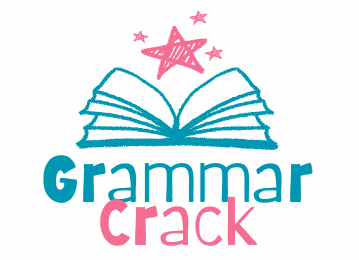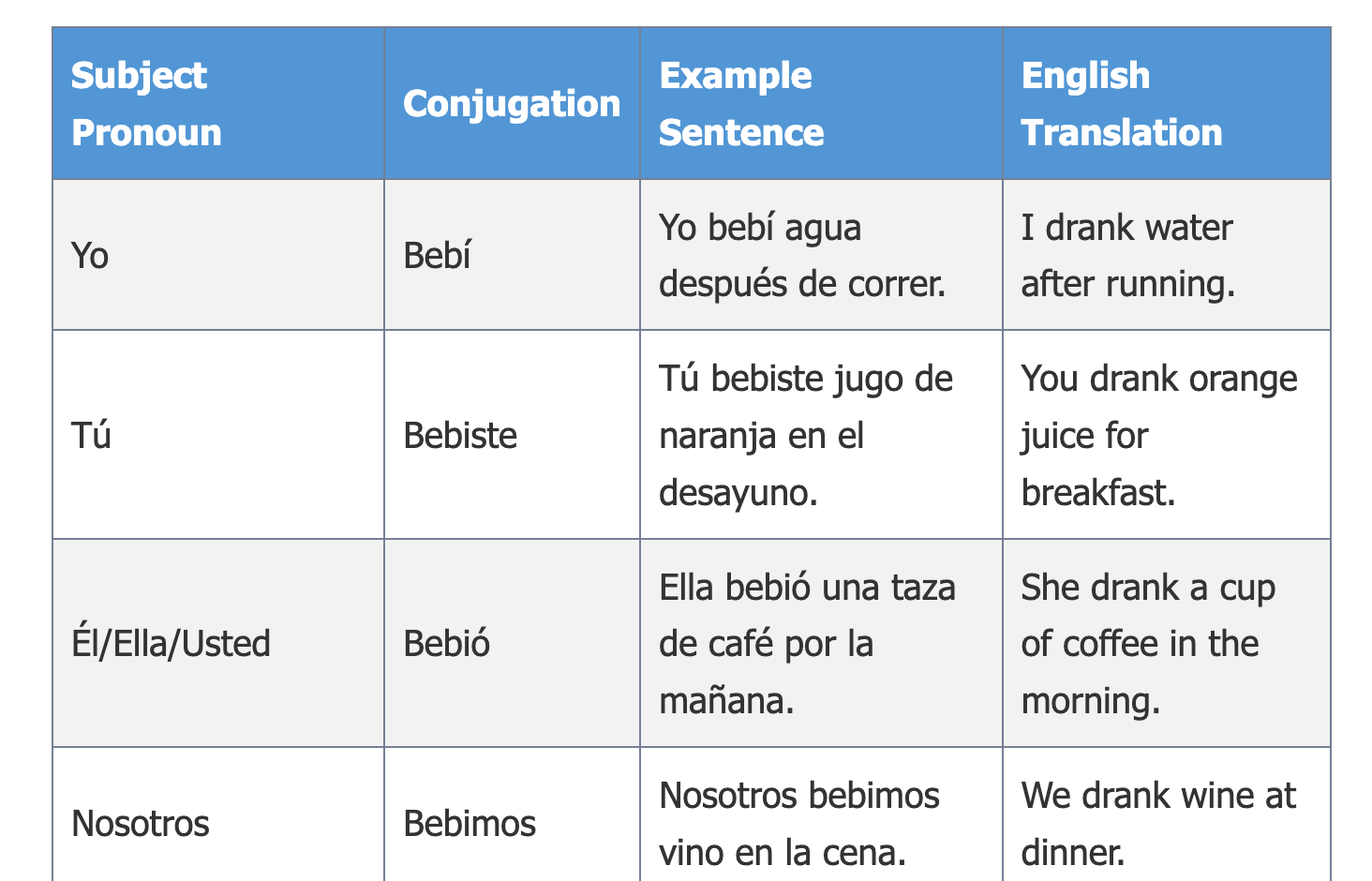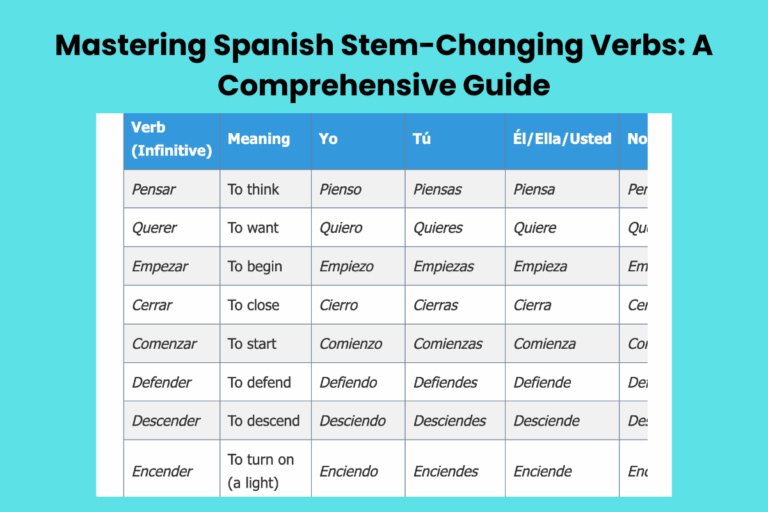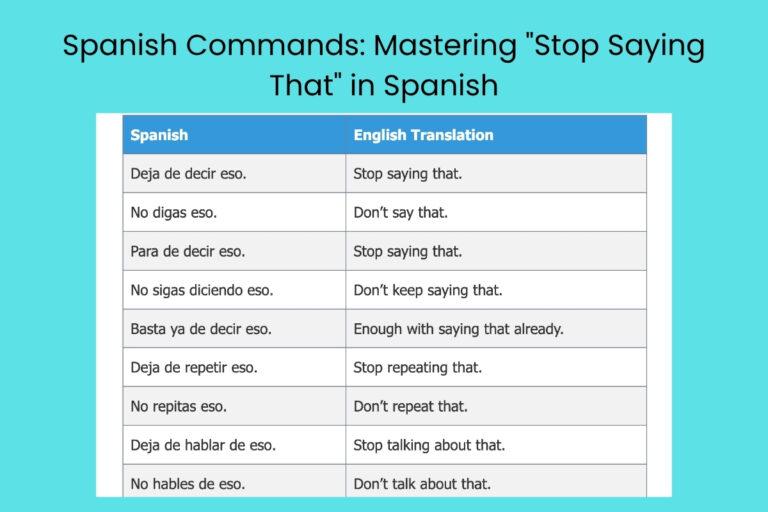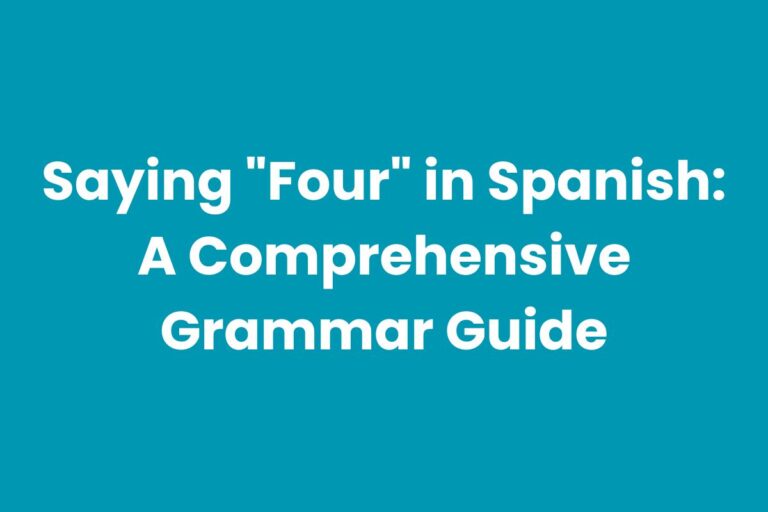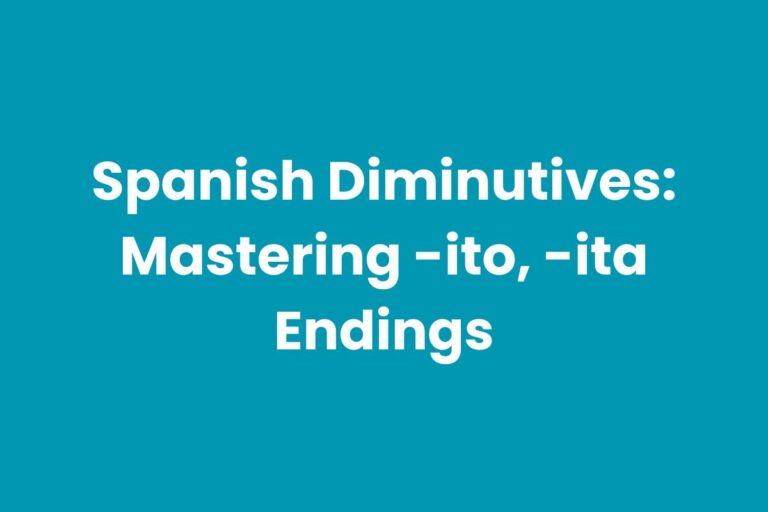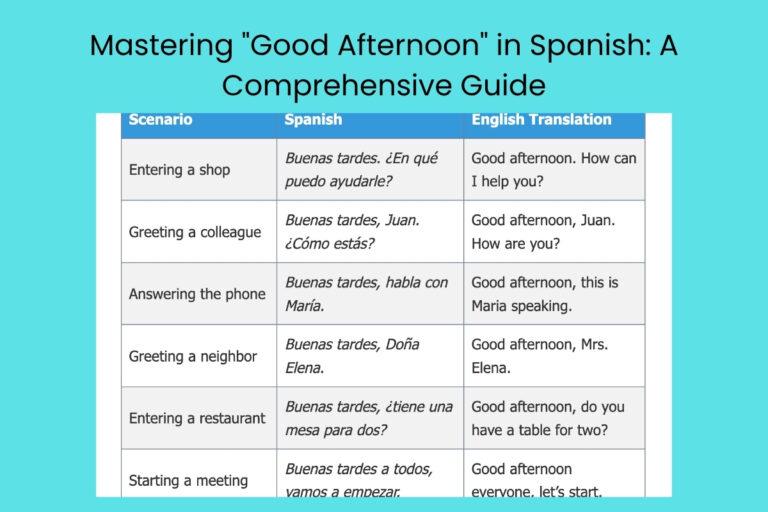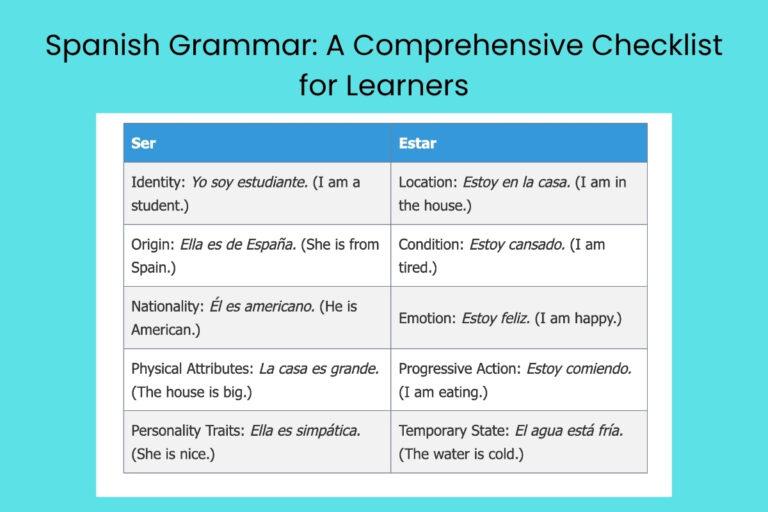Drank in Spanish Past Tense: A Comprehensive Guide
Understanding how to express “drank” in Spanish is crucial for anyone learning the language. It involves navigating different past tenses, each with its own nuance and usage.
Mastering these forms allows you to accurately describe past actions related to drinking, whether you’re talking about a single event or a recurring habit. This guide provides a comprehensive overview of the various ways to say “drank” in Spanish, including explanations, examples, and practice exercises.
It is designed for students of all levels, from beginners to advanced learners looking to refine their understanding of past tense conjugation.
Table of Contents
- Introduction
- Definition of “Drank” in Spanish
- Structural Breakdown of Past Tenses
- Types of Past Tenses for “Drank”
- Examples of “Drank” in Spanish
- Usage Rules
- Common Mistakes
- Practice Exercises
- Advanced Topics
- FAQ
- Conclusion
Introduction
Mastering the expression of past actions is fundamental for fluency in any language, and Spanish is no exception. The verb “to drink,” or beber in Spanish, offers a particularly rich set of conjugations across various past tenses. Understanding how to correctly use these tenses allows you to convey not just that someone drank something, but also when, how often, and in what context the drinking occurred. This article serves as a comprehensive guide to expressing “drank” in Spanish, covering the preterite, imperfect, perfect, pluperfect, and conditional perfect tenses. It’s designed for learners of all levels, from those just starting their Spanish journey to advanced speakers seeking to refine their grasp of these subtle but important grammatical distinctions.
By the end of this guide, you will have a solid understanding of when and how to use each past tense form of beber, enabling you to communicate more accurately and effectively in Spanish. Whether you’re describing a single event, a habitual action, or a hypothetical situation, this article will provide you with the tools you need to express yourself with confidence.
Definition of “Drank” in Spanish
The word “drank” is the past tense form of the verb “to drink.” In Spanish, the verb “to drink” is beber. To express “drank” in Spanish, you need to use different past tense conjugations of beber depending on the context. These include the preterite (pretérito indefinido), imperfect (pretérito imperfecto), perfect (pretérito perfecto compuesto), pluperfect (pretérito pluscuamperfecto), and conditional perfect (condicional compuesto) tenses.
Each of these tenses conveys a slightly different meaning and is used in different situations. The preterite is used for completed actions in the past. The imperfect is used for habitual actions in the past or to describe a past state. The perfect is used for actions completed recently or that have relevance to the present. The pluperfect is used for actions that were completed before another action in the past. The conditional perfect is used to express what would have happened under certain conditions in the past.
Understanding these nuances is essential for accurate and effective communication in Spanish. Choosing the correct tense will ensure that your message is clear and that you convey the intended meaning.
Structural Breakdown of Past Tenses
The structure of Spanish past tenses involves understanding the conjugation patterns of verbs. For regular verbs like beber, the endings change according to the tense and the subject pronoun. Irregular verbs have their own unique conjugation patterns that must be memorized.
Preterite: The preterite tense is formed by adding specific endings to the verb stem. For beber, the stem is beb-. The endings are: -í (yo), -iste (tú), -ió (él/ella/usted), -imos (nosotros), -isteis (vosotros), -ieron (ellos/ellas/ustedes).
Imperfect: The imperfect tense is formed by adding different endings to the verb stem. For beber, the endings are: -ía (yo), -ías (tú), -ía (él/ella/usted), -íamos (nosotros), -íais (vosotros), -ían (ellos/ellas/ustedes).
Perfect: The perfect tense is a compound tense formed with the auxiliary verb haber (to have) in the present tense + the past participle of the main verb (bebido). For example: he bebido (I have drunk), has bebido (you have drunk), etc.
Pluperfect: The pluperfect tense is also a compound tense, formed with the auxiliary verb haber in the imperfect tense + the past participle of the main verb (bebido). For example: había bebido (I had drunk), habías bebido (you had drunk), etc.
Conditional Perfect: The conditional perfect is formed using the conditional form of the verb *haber* plus the past participle of the main verb. For example: habría bebido (I would have drunk), habrías bebido (you would have drunk), etc.
Types of Past Tenses for “Drank”
Preterite (Simple Past)
The preterite tense (pretérito indefinido) is used to describe actions that were completed at a specific point in the past. It is used for single, completed events that are seen as finished and not ongoing. It is often used with time markers like “ayer” (yesterday), “la semana pasada” (last week), or “en 2010” (in 2010).
For the verb beber, the preterite conjugations are: bebí (I drank), bebiste (you drank), bebió (he/she/you drank), bebimos (we drank), bebisteis (you all drank), bebieron (they/you all drank).
Imperfect
The imperfect tense (pretérito imperfecto) is used to describe ongoing or habitual actions in the past. It is also used to describe states of being in the past, to set the scene, or to describe what someone “used to do.” It often implies that the action was not completed or that it occurred repeatedly.
For the verb beber, the imperfect conjugations are: bebía (I drank/was drinking/used to drink), bebías (you drank/were drinking/used to drink), bebía (he/she/you drank/was drinking/used to drink), bebíamos (we drank/were drinking/used to drink), bebíais (you all drank/were drinking/used to drink), bebían (they/you all drank/were drinking/used to drink).
Perfect (Present Perfect)
The perfect tense (pretérito perfecto compuesto) is used to describe actions that have been completed recently or that have relevance to the present. It is formed using the present tense of the auxiliary verb haber (to have) and the past participle of the main verb (bebido).
The perfect conjugations for beber are: he bebido (I have drunk), has bebido (you have drunk), ha bebido (he/she/you have drunk), hemos bebido (we have drunk), habéis bebido (you all have drunk), han bebido (they/you all have drunk).
Pluperfect (Past Perfect)
The pluperfect tense (pretérito pluscuamperfecto) is used to describe actions that were completed before another action in the past. It is formed using the imperfect tense of the auxiliary verb haber (to have) and the past participle of the main verb (bebido).
The pluperfect conjugations for beber are: había bebido (I had drunk), habías bebido (you had drunk), había bebido (he/she/you had drunk), habíamos bebido (we had drunk), habíais bebido (you all had drunk), habían bebido (they/you all had drunk).
Conditional Perfect
The conditional perfect (condicional compuesto) is used to describe actions that would have happened if a certain condition had been met in the past. It expresses hypothetical past situations and is formed using the conditional of the auxiliary verb *haber* (to have) and the past participle of the main verb (bebido).
The conditional perfect conjugations for beber are: habría bebido (I would have drunk), habrías bebido (you would have drunk), habría bebido (he/she/you would have drunk), habríamos bebido (we would have drunk), habríais bebido (you all would have drunk), habrían bebido (they/you all would have drunk).
Examples of “Drank” in Spanish
Below are examples of how to use “drank” in Spanish in different tenses. Each section provides context and illustrates the specific usage of each tense.
Preterite Examples
The following table provides examples of the preterite tense of beber in various sentences. Note how each sentence describes a completed action in the past.
| Subject Pronoun | Conjugation | Example Sentence | English Translation |
|---|---|---|---|
| Yo | Bebí | Yo bebí agua después de correr. | I drank water after running. |
| Tú | Bebiste | Tú bebiste jugo de naranja en el desayuno. | You drank orange juice for breakfast. |
| Él/Ella/Usted | Bebió | Ella bebió una taza de café por la mañana. | She drank a cup of coffee in the morning. |
| Nosotros | Bebimos | Nosotros bebimos vino en la cena. | We drank wine at dinner. |
| Vosotros | Bebisteis | Vosotros bebisteis cerveza en el bar. | You all drank beer at the bar. |
| Ellos/Ellas/Ustedes | Bebieron | Ellos bebieron refrescos en la fiesta. | They drank soda at the party. |
| Yo | Bebí | Bebí un vaso de leche antes de acostarme. | I drank a glass of milk before going to bed. |
| Tú | Bebiste | ¿Bebiste toda la soda? | Did you drink all the soda? |
| Él/Ella/Usted | Bebió | Él bebió agua rápidamente porque tenía mucha sed. | He drank water quickly because he was very thirsty. |
| Nosotros | Bebimos | Ayer, bebimos té helado en el parque. | Yesterday, we drank iced tea in the park. |
| Vosotros | Bebisteis | Bebisteis demasiado anoche. | You all drank too much last night. |
| Ellos/Ellas/Ustedes | Bebieron | Los niños bebieron jugo de manzana después del partido. | The children drank apple juice after the game. |
| Yo | Bebí | Bebí un trago de tequila para olvidar mis problemas. | I drank a shot of tequila to forget my problems. |
| Tú | Bebiste | Bebiste algo de alcohol en la fiesta? | Did you drink some alcohol at the party? |
| Él/Ella/Usted | Bebió | El gato bebió toda la leche del plato. | The cat drank all the milk from the plate. |
| Nosotros | Bebimos | Bebimos champán para celebrar el Año Nuevo. | We drank champagne to celebrate the New Year. |
| Vosotros | Bebisteis | ¿Bebisteis vino tinto o blanco? | Did you drink red or white wine? |
| Ellos/Ellas/Ustedes | Bebieron | Los atletas bebieron bebidas energéticas después de la competencia. | The athletes drank energy drinks after the competition. |
| Yo | Bebí | Bebí un licuado de frutas después del gimnasio. | I drank a fruit smoothie after the gym. |
| Tú | Bebiste | Bebiste café con leche esta mañana? | Did you drink coffee with milk this morning? |
| Él/Ella/Usted | Bebió | El perro bebió agua del charco. | The dog drank water from the puddle. |
| Nosotros | Bebimos | Bebimos cerveza artesanal en el festival. | We drank craft beer at the festival. |
| Vosotros | Bebisteis | Bebisteis té caliente para calentaros. | You all drank hot tea to warm yourselves up. |
| Ellos/Ellas/Ustedes | Bebieron | Los invitados bebieron vino durante la recepción. | The guests drank wine during the reception. |
Imperfect Examples
The following table illustrates the use of the imperfect tense of beber to describe habitual or ongoing actions in the past.
| Subject Pronoun | Conjugation | Example Sentence | English Translation |
|---|---|---|---|
| Yo | Bebía | Yo bebía leche todos los días cuando era niño. | I drank milk every day when I was a child. |
| Tú | Bebías | Tú bebías mucho café cuando trabajabas en la oficina. | You drank a lot of coffee when you worked in the office. |
| Él/Ella/Usted | Bebía | Ella bebía té de manzanilla para relajarse. | She drank chamomile tea to relax. |
| Nosotros | Bebíamos | Nosotros bebíamos cerveza en la playa durante el verano. | We drank beer on the beach during the summer. |
| Vosotros | Bebíais | Vosotros bebíais vino con cada comida. | You all drank wine with every meal. |
| Ellos/Ellas/Ustedes | Bebían | Ellos bebían agua antes de hacer ejercicio. | They drank water before exercising. |
| Yo | Bebía | Cuando era joven, bebía mucha soda. | When I was young, I used to drink a lot of soda. |
| Tú | Bebías | ¿Bebías jugo de naranja por las mañanas? | Did you used to drink orange juice in the mornings? |
| Él/Ella/Usted | Bebía | Antes, él bebía mucho alcohol, pero ahora ya no. | Before, he used to drink a lot of alcohol, but not anymore. |
| Nosotros | Bebíamos | En el verano, bebíamos limonada casera. | In the summer, we used to drink homemade lemonade. |
| Vosotros | Bebíais | ¿Bebíais agua del grifo en vuestro pueblo? | Did you used to drink tap water in your town? |
| Ellos/Ellas/Ustedes | Bebían | Siempre bebían café después de la cena. | They always used to drink coffee after dinner. |
| Yo | Bebía | Bebía té para calentarme en invierno. | I used to drink tea to warm myself up in winter. |
| Tú | Bebías | Bebías agua con gas o natural? | Did you use to drink sparkling or still water? |
| Él/Ella/Usted | Bebía | Ella bebía vino tinto en las noches frías. | She used to drink red wine on cold nights. |
| Nosotros | Bebíamos | Bebíamos cerveza en el jardín los fines de semana. | We used to drink beer in the garden on weekends. |
| Vosotros | Bebíais | Bebíais chocolate caliente durante la Navidad. | You all used to drink hot chocolate during Christmas. |
| Ellos/Ellas/Ustedes | Bebían | Bebían jugo de frutas frescas todos los días. | They used to drink fresh fruit juice every day. |
| Yo | Bebía | Bebía batidos de proteínas después del gimnasio. | I used to drink protein shakes after the gym. |
| Tú | Bebías | Bebías refrescos en el cine? | Did you used to drink sodas at the cinema? |
| Él/Ella/Usted | Bebía | Él bebía café para mantenerse despierto en la noche. | He used to drink coffee to stay awake at night. |
| Nosotros | Bebíamos | Bebíamos agua de coco directamente del coco. | We used to drink coconut water directly from the coconut. |
| Vosotros | Bebíais | Bebíais limonada en las tardes calurosas. | You all used to drink lemonade on hot afternoons. |
| Ellos/Ellas/Ustedes | Bebían | Bebían tinto de verano en los bares. | They used to drink “tinto de verano” in bars. |
Perfect Examples
The following table demonstrates the perfect tense of beber, used to describe actions that have relevance to the present.
| Subject Pronoun | Conjugation | Example Sentence | English Translation |
|---|---|---|---|
| Yo | He bebido | Yo he bebido tres tazas de café hoy. | I have drunk three cups of coffee today. |
| Tú | Has bebido | ¿Has bebido suficiente agua hoy? | Have you drunk enough water today? |
| Él/Ella/Usted | Ha bebido | Ella ha bebido mucho vino en la fiesta. | She has drunk a lot of wine at the party. |
| Nosotros | Hemos bebido | Nosotros hemos bebido champán para celebrar. | We have drunk champagne to celebrate. |
| Vosotros | Habéis bebido | ¿Habéis bebido algo de alcohol hoy? | Have you all drunk any alcohol today? |
| Ellos/Ellas/Ustedes | Han bebido | Ellos han bebido toda la cerveza. | They have drunk all the beer. |
| Yo | He bebido | No he bebido alcohol en meses. | I haven’t drunk alcohol in months. |
| Tú | Has bebido | ¿Has bebido el té que te preparé? | Have you drunk the tea I made for you? |
| Él/Ella/Usted | Ha bebido | Él ha bebido mucha agua porque está haciendo mucho calor. | He has drunk a lot of water because it’s very hot. |
| Nosotros | Hemos bebido | Hemos bebido mucha cerveza durante el partido. | We have drunk a lot of beer during the game. |
| Vosotros | Habéis bebido | ¿Habéis bebido toda la leche? | Have you all drunk all the milk? |
| Ellos/Ellas/Ustedes | Han bebido | Han bebido vino de la mejor calidad. | They have drunk wine of the best quality. |
| Yo | He bebido | He bebido un batido de frutas esta mañana. | I have drunk a fruit smoothie this morning. |
| Tú | Has bebido | ¿Has bebido café hoy? | Have you drunk coffee today? |
| Él/Ella/Usted | Ha bebido | Ella ha bebido suficiente agua para mantenerse hidratada. | She has drunk enough water to stay hydrated. |
| Nosotros | Hemos bebido | Hemos bebido refrescos durante toda la tarde. | We have drunk sodas all afternoon. |
| Vosotros | Habéis bebido | ¿Habéis bebido algo caliente hoy? | Have you all drunk something hot today? |
| Ellos/Ellas/Ustedes | Han bebido | Han bebido toda la limonada que hice. | They have drunk all the lemonade I made. |
| Yo | He bebido | He bebido un vaso de agua antes de salir. | I have drunk a glass of water before leaving. |
| Tú | Has bebido | ¿Has bebido un jugo verde hoy? | Have you drunk a green juice today? |
| Él/Ella/Usted | Ha bebido | Él ha bebido mucha cerveza en el bar. | He has drunk a lot of beer at the bar. |
| Nosotros | Hemos bebido | Hemos bebido vino en la cena. | We have drunk wine at dinner. |
| Vosotros | Habéis bebido | ¿Habéis bebido algo de alcohol en la fiesta? | Have you all drunk any alcohol at the party? |
| Ellos/Ellas/Ustedes | Han bebido | Han bebido toda la sangría. | They have drunk all the sangria. |
Pluperfect Examples
This table shows how to use the pluperfect tense of beber to describe actions completed before another action in the past.
| Subject Pronoun | Conjugation | Example Sentence | English Translation |
|---|---|---|---|
| Yo | Había bebido | Yo ya había bebido agua cuando llegué a casa. | I had already drunk water when I arrived home. |
| Tú | Habías bebido | Tú habías bebido mucho antes de que llegáramos. | You had drunk a lot before we arrived. |
| Él/Ella/Usted | Había bebido | Ella había bebido todo el jugo antes de que yo pudiera probarlo. | She had drunk all the juice before I could try it. |
| Nosotros | Habíamos bebido | Nosotros habíamos bebido todo el vino antes de la cena. | We had drunk all the wine before dinner. |
| Vosotros | Habíais bebido | Vosotros habíais bebido mucho antes de que yo llegara a la fiesta. | You all had drunk a lot before I arrived at the party. |
| Ellos/Ellas/Ustedes | Habían bebido | Ellos ya habían bebido toda la cerveza cuando nos unimos a ellos. | They had already drunk all the beer when we joined them. |
| Yo | Había bebido | Antes de que me ofrecieras agua, ya había bebido un refresco. | Before you offered me water, I had already drunk a soda. |
| Tú | Habías bebido | Ya habías bebido café cuando te ofrecí té. | You had already drunk coffee when I offered you tea. |
| Él/Ella/Usted | Había bebido | Ella había bebido un vaso de vino antes de que llegara la cena. | She had drunk a glass of wine before dinner arrived. |
| Nosotros | Habíamos bebido | Nosotros ya habíamos bebido champán cuando brindamos. | We had already drunk champagne when we made a toast. |
| Vosotros | Habíais bebido | Vosotros habíais bebido todo el jugo de naranja antes de que tuviéramos tiempo de servirnos. | You all had drunk all the orange juice before we had time to serve ourselves. |
| Ellos/Ellas/Ustedes | Habían bebido | Ellos ya habían bebido toda el agua antes de que comenzara la caminata. | They had already drunk all the water before the hike started. |
| Yo | Había bebido | Yo había bebido un batido de proteínas antes de ir al gimnasio. | I had drunk a protein shake before going to the gym. |
| Tú | Habías bebido | Ya habías bebido café antes de que yo me despertara. | You had already drunk coffee before I woke up. |
| Él/Ella/Usted | Había bebido | Él había bebido mucha agua antes de correr la maratón. | He had drunk a lot of water before running the marathon. |
| Nosotros | Habíamos bebido | Nosotros habíamos bebido toda la sangría antes de que llegaran los invitados. | We had drunk all the sangria before the guests arrived. |
| Vosotros | Habíais bebido | Vosotros habíais bebido todo el vino antes de que terminara la cena. | You all had drunk all the wine before dinner was over. |
| Ellos/Ellas/Ustedes | Habían bebido | Ellos habían bebido toda la cerveza antes de que llegara la banda. | They had drunk all the beer before the band arrived. |
| Yo | Había bebido | Había bebido un vaso de leche antes de acostarme. | I had drunk a glass of milk before going to bed. |
| Tú | Habías bebido | Habías bebido té antes de que te ofreciera café. | You had drunk tea before I offered you coffee. |
| Él/Ella/Usted | Había bebido | Él había bebido agua rápidamente porque tenía mucha sed. | He had drunk water quickly because he was very thirsty. |
| Nosotros | Habíamos bebido | Habíamos bebido té helado antes de ir al parque. | We had drunk iced tea before going to the park. |
| Vosotros | Habíais bebido | Habíais bebido demasiado anoche antes de ir a casa. | You all had drunk too much last night before going home. |
| Ellos/Ellas/Ustedes | Habían bebido | Los niños habían bebido jugo de manzana antes de que llegaran sus padres. | The children had drunk apple juice before their parents arrived. |
Conditional Perfect Examples
The following table illustrates the use of the conditional perfect tense of beber to describe actions that would have happened if a certain condition had been met in the past.
| Subject Pronoun | Conjugation | Example Sentence | English Translation |
|---|---|---|---|
| Yo | Habría bebido | Yo habría bebido más agua si hubiera sabido que haría tanto calor. | I would have drunk more water if I had known it would be so hot. |
| Tú | Habrías bebido | Tú habrías bebido el vino si te hubiera gustado. | You would have drunk the wine if you had liked it. |
| Él/Ella/Usted | Habría bebido | Ella habría bebido el café si no estuviera tan ocupada. | She would have drunk the coffee if she weren’t so busy. |
| Nosotros | Habríamos bebido | Nosotros habríamos bebido champán si hubiéramos tenido algo que celebrar. | We would have drunk champagne if we had had something to celebrate. |
| Vosotros | Habríais bebido | Vosotros habríais bebido más cerveza si no tuvierais que conducir. | You all would have drunk more beer if you didn’t have to drive. |
| Ellos/Ellas/Ustedes | Habrían bebido | Ellos habrían bebido el jugo si no estuviera agrio. | They would have drunk the juice if it weren’t sour. |
| Yo | Habría bebido | Si hubiera tenido sed, habría bebido más agua. | If I had been thirsty, I would have drunk more water. |
| Tú | Habrías bebido | Si no hubieras estado conduciendo, habrías bebido una cerveza. | If you hadn’t been driving, you would have drunk a beer. |
| Él/Ella/Usted | Habría bebido | Si no hubiera tenido prisa, ella habría bebido su café con calma. | If she hadn’t been in a hurry, she would have drunk her coffee calmly. |
| Nosotros | Habríamos bebido | Si hubiéramos sabido que la fiesta era tan larga, habríamos bebido más despacio. | If we had known the party was so long, we would have drunk more slowly. |
| Vosotros | Habríais bebido | Si hubierais tenido más tiempo, habríais bebido más vino. | If you all had had more time, you would have drunk more wine. |
| Ellos/Ellas/Ustedes | Habrían bebido | Si hubiera habido suficiente, habrían bebido más jugo. | If there had been enough, they would have drunk more juice. |
| Yo | Habría bebido | Habría bebido un batido si hubiera tenido los ingredientes. | I would have drunk a smoothie if I had had the ingredients. |
| Tú | Habrías bebido | Habrías bebido té si no te gustara el café. | You would have drunk tea if you didn’t like coffee. |
| Él/Ella/Usted | Habría bebido | Él habría bebido más agua si no hubiera estado tan frío. | He would have drunk more water if it hadn’t been so cold. |
| Nosotros | Habríamos bebido | Habríamos bebido más si la bebida no fuera tan cara. | We would have drunk more if the drink wasn’t so expensive. |
| Vosotros | Habríais bebido | Habríais bebido más si no tuvierais que levantaros temprano. | You all would have drunk more if you didn’t have to get up early. |
| Ellos/Ellas/Ustedes | Habrían bebido | Habrían bebido más si hubieran tenido sed. | They would have drunk more if they had been thirsty. |
| Yo | Habría bebido | Habría bebido vino si no me doliera la cabeza. | I would have drunk wine if my head didn’t hurt. |
| Tú | Habrías bebido | Habrías bebido un refresco si tuvieras sed. | You would have drunk a soda if you were thirsty. |
| Él/Ella/Usted | Habría bebido | Él habría bebido un trago si no estuviera trabajando. | He would have drunk a shot if he wasn’t working. |
| Nosotros | Habríamos bebido | Habríamos bebido más cerveza si no tuviéramos que conducir. | We would have drunk more beer if we didn’t have to drive. |
| Vosotros | Habríais bebido | Habríais bebido más si no fuera tan tarde. | You all would have drunk more if it wasn’t so late. |
| Ellos/Ellas/Ustedes | Habrían bebido | Habrían bebido si les hubieras ofrecido algo. | They would have drunk if you had offered them something. |
Usage Rules
Understanding the specific contexts in which to use each past tense is vital for accurate communication. Here’s a breakdown of the usage rules for each tense when expressing “drank” in Spanish.
Preterite Usage
Use the preterite tense to describe actions that:
- Were completed at a specific point in the past.
- Are seen as finished and not ongoing.
- Often occur with time markers like “ayer” (yesterday), “la semana pasada” (last week), or “en 2010” (in 2010).
Imperfect Usage
Use the imperfect tense to describe actions that:
- Were ongoing or habitual in the past.
- Describe states of being in the past.
- Set the scene or describe what someone “used to do.”
- Imply that the action was not completed or occurred repeatedly.
Perfect Usage
Use the perfect tense to describe actions that:
- Have been completed recently.
- Have relevance to the present.
Pluperfect Usage
Use the pluperfect tense to describe actions that:
- Were completed before another action in the past.
Conditional Perfect Usage
Use the conditional perfect tense to describe actions that:
- Would have happened if a certain condition had been met in the past.
- Express hypothetical past situations.
Common Mistakes
One of the most common mistakes is confusing the preterite and imperfect tenses. Remember, the preterite is for completed actions, while the imperfect is for ongoing or habitual actions in the past.
Another common mistake is using the wrong verb endings or using the incorrect auxiliary verb with compound tenses.
Practice Exercises
Test your understanding with the following exercises. Fill in the blanks with the correct form of “beber” in the past tense.
Exercise 1: Preterite vs. Imperfect
Exercise 2: Perfect Tenses
Advanced Topics
For advanced learners, understanding the subjunctive past tenses and the literary usage of past tenses can further enhance your command of Spanish.
Subjunctive Past Tenses
The subjunctive mood is used to express doubt, uncertainty, wishes, or emotions. In the past, the subjunctive has two main forms: the imperfect subjunctive and the pluperfect subjunctive.
These are used in subordinate clauses when the main clause is in the past.
Literary Usage of Past Tenses
In literature, past tenses are often used creatively to set the mood, develop characters, and convey deeper meanings. Authors may switch between tenses to create a sense of nostalgia, suspense, or irony.
Understanding these nuances can greatly enhance your appreciation of Spanish literature.
FAQ
Conclusion
Mastering the various past tenses of “beber” in Spanish is essential for expressing yourself accurately and effectively. By understanding the nuances of the preterite, imperfect, perfect, pluperfect, and conditional perfect tenses, you can convey not just that someone drank something, but also when, how often, and in what context the drinking occurred.
Keep practicing with examples and exercises to solidify your understanding and improve your fluency. ¡Buena suerte!
